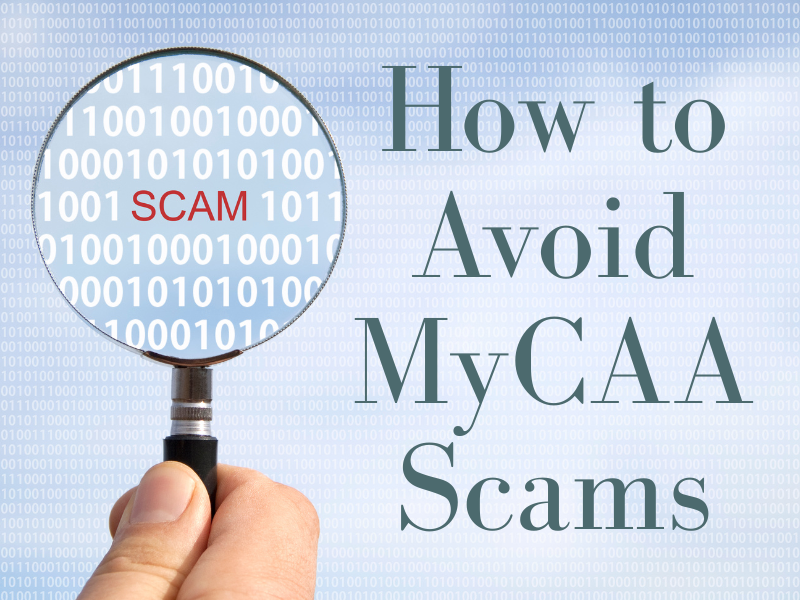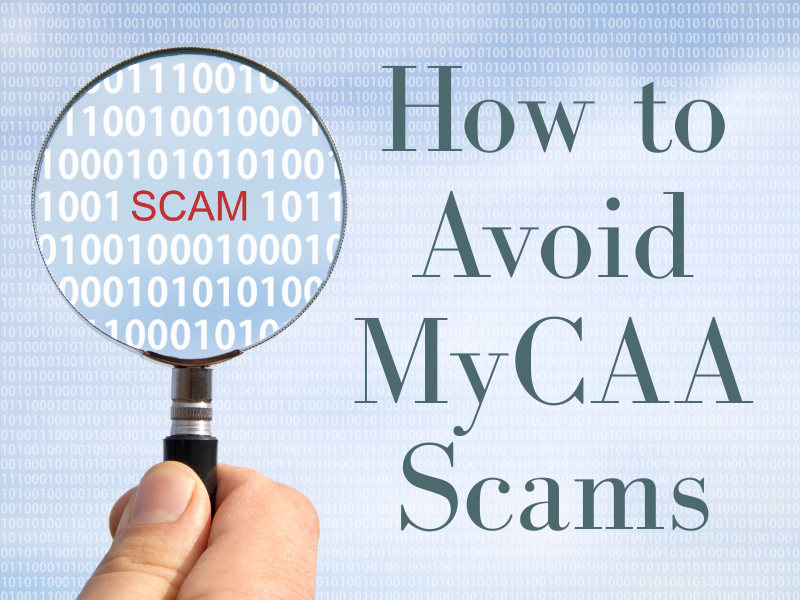Previous Post
MyCAA Scams: What Every Military Spouse Needs to Know—and How to Fight Back
Posted on November 2, 2025 by Charlie Marlow
Military spouses know the value of a flexible education benefit—and for eligible spouses, the Military Spouse Career Advancement Account (MyCAA) program offers up to $4,000 toward licenses, certificates or an associate degree. Unfortunately, that funding can attract scam artists, from predatory schools to imposter coaches. Here’s how to spot the most common MyCAA scams, verify a program’s legitimacy, and report fraud to protect you and your community.
1. Common MyCAA Scam Schemes
- Predatory For-Profit Colleges Some institutions aggressively recruit with promises of guaranteed certification or “fast-track” degrees—only to lock you into high fees, subpar instruction or programs not approved for MyCAA use. Martinsburg College, for example, advertised itself as “MyCAA-friendly” then sued a spouse who called it a scam online. (2)
- Imposter Coaches on Social Media You’ll sometimes see unsolicited Facebook messages or Instagram DMs from “MyCAA advisors” offering to fast-track your scholarship. They’ll request your login details or ask for “expedited processing fees.” No one from MyCAA contacts you on social media—ever. If it’s unsolicited, it’s a red flag. (3)
- Unaccredited or Ineligible Programs Fraudsters sometimes steer spouses to schools that lack regional accreditation or don’t participate in MyCAA. They’ll say your dream program is approved when it isn’t—then the scholarship funds go nowhere. Always verify accreditation through recognized bodies like CHEA or the U.S. Department of Education. (3)
2. Red Flags: How to Spot a MyCAA Scam – Borrowing from best practices in scam detection:
- Upfront Payment Requests: Legitimate MyCAA schools bill the DoD directly. If anyone asks you to wire money or pay a “service fee,” that’s a scam indicator. (4)
- High-Pressure Tactics: “Enroll now or risk losing funds!” Real MyCAA counselors encourage you to research and apply at your own pace.
- Vague or Inconsistent Information: Look out for typos, contradictory program details or websites that don’t clearly list an institution’s accreditation.
- Untraceable Contact Info: No official phone number, PO box instead of a campus address, or email domains not matching the institution’s website.
- Too-Good-to-Be-True Promises: “100% job placement guarantee” or “complete your degree in two months” rarely exist for quality programs—and MyCAA’s strict rules simply don’t allow it. (5)
3. Verifying MyCAA Opportunity Legitimacy
- Use the Official MyCAA Portal Create an account via the DoD Self-Service (DS) portal, then explore the “Approved Programs” list. Only schools on that list can receive your scholarship dollars. (5)
- Contact SECO/Career Coaches The Spouse Education and Career Opportunities (SECO) office offers free, unbiased coaching. You’ll never be charged, and they’ll guide you through building an Education and Training Plan that’s guaranteed MyCAA-compliant.
- Check Accreditation Search the Council for Higher Education Accreditation (CHEA) database or the U.S. Department of Education’s listings. Accredited institutions must meet quality standards—a must for any scholarship-funded program.
- Ask for Documentation Legit schools will share proof of MyCAA approval, say, a school-specific MyCAA participation letter or your program’s CIP code. If they dodge or delay, move on.
4. Reporting Scams: Your Action Plan
- Federal Trade Commission (FTC): File a report at ReportFraud.ftc.gov to help the FTC track and shut down scam operations nationwide. (6)
- U.S. Government Scam Reporter: Use USA.gov’s tool to identify the correct agency (FTC, CFPB, state attorney general, etc.) based on your situation. (7)
- FBI Internet Crime Complaint Center (IC3): For online fraud, submit complaints at ic3.gov, especially if your personal data or funds were taken electronically. (6)
- Military OneSource/SECO: Let your SECO counselor and Military OneSource know about any suspicious outreach so they can alert other spouses and base leadership. (1)
- State Attorney General & CFPB: If a school misused MyCAA funds, file with your state AG’s consumer protection division and the Consumer Financial Protection Bureau for additional enforcement avenues.
5. Staying One Step Ahead
- Lean on community reviews—veteran spouses often share honest feedback on base spouse groups or reputable forums (e.g., Military.com’s Education section).
- Attend official MyCAA webinars or briefings rather than third-party events.
- Bookmark the MyCAA FAQ and Military OneSource benefit pages—they’re your gold standards for accurate info. (1)
By knowing the most common scams, spotting red flags, verifying programs through official channels, and reporting suspicious activity, you’ll not only protect your own MyCAA funds but help safeguard the entire military spouse community.
Explore More with My Military Lifestyle and Finance!
Sources:
- https://www.militaryonesource.mil/benefits/mycaa-scholarship-program/
- https://defendstudents.org/cases/martinsburg-college-v-murrayClassactionu.org
- https://www.reddit.com/r/USMilitarySO/comments/rcr88a/anyone_ever_been_scammed_out_of_their_mycaa/Bing.com
- https://classactionu.org/class-actions/is-a-class-action-real-or-scam/
- https://medcerts.com/blog/so-is-mycaa-legit-yes-heres-what-to-know
- https://www.bing.com/search?q=how+to+report+MyCAA+scams&toWww=1&redig=573D4E7B7359491FBC58D8060A32A724
- https://www.usa.gov/where-report-scams
Next Post
Written by
More Military Life Posts







